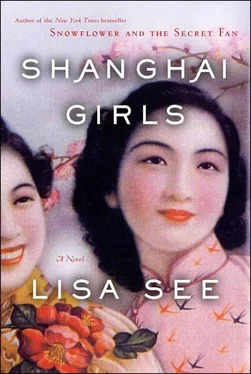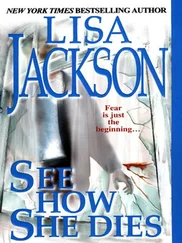We climb the stairs back to the apartment. At the door, she holds me back once again. “Why can’t you be the sister I knew in Shanghai? You were fun. You weren’t afraid of anything. Now you act like a fu yen .” She pauses. “I’m sorry. That sounded terrible. I know you’ve been through a lot, and I realize you have to give all your attention and care to the baby. But I miss you, Pearl. I miss my sister.”
From inside we hear Yen-yen coo to her son. “Boy-husband, it’s time for you to go to bed. Go get your wife and go to bed now.”
“I miss Mama and Baba. I miss our home. And this”-she gestures around the dark hallway-“is all so hard. I can’t do it without you.” Tears roll down her cheeks. She wipes them away roughly, takes a breath, and enters the apartment to go to her room with her boy-husband.
A few minutes later, I lay Joy in her drawer and get in bed. Sam rolls away from me, as he usually does, and I cling to the edge of the bed as far from him and as close to Joy as I can get. My feelings and thoughts are confused. The clothes are yet another unanticipated blow, but what about the other things May said? I hadn’t realized she was suffering too. And she was right about me. I have been afraid: to leave the apartment, to go to the end of Sanchez Alley, to enter the Plaza, to walk down Olvera Street, and to cross the street to China City. These past weeks, May had offered many times: “I’ll take you to China City whenever you want to go.” But I hadn’t gone.
I grab the pouch Mama gave me through my clothes. What’s happened to me? How have I become such a scared fu yen?.
ON JUNE 25, just a few blocks away and less than three weeks later, New Chinatown has its Grand Opening. Big traditional Chinese carved gates stand stately and colorful at each end of the block. Anna May Wong, the glamorous movie star, leads the parade. A Chinese all-girl drum corps gives a rousing performance. Neon lights outline gaily painted buildings decorated with all manner of Chinese froufrou on the eaves and balconies. Everything seems bigger and better there. They have more firecrackers, more important politicians to cut the ribbons and make speeches, more sinuous and acrobatic crews to perform the dragon and lion dances. Even the people who’ve opened shops and restaurants there are considered better, wealthier, and more established than those of us in China City.
People say that the opening of these two Chinatowns is the beginning of good times for Chinese in Los Angeles. I say it’s the beginning of hard feelings. In China City, we have to do more and make a better effort. My father-in-law uses his iron fist to make us all work even longer hours. He’s relentless and often cruel. None of us disobey him, but I don’t see how we’ll ever catch up. How can you compete when others have a larger advantage? And with things the way they are, how are we ever going to make our own money to leave this place?
I SHOULD BE plotting where May, Joy, and I will go, but I find that nothing drives me to explore more than my stomach, where my loneliness has settled. I miss things like honey-covered dough confections, sugared rose cakes, and spiced eggs boiled in tea. Having lost even more weight from Yen-yen’s cooking than I did on Angel Island, I watch Uncle Wilburt and Uncle Charley, the first and second cooks at the Golden Dragon, and try to learn from them. They let me go with them to the Sam Sing Butcher Shop with its gold-leafed pig in the window to buy pork and duck. They take me to George Wong’s fish market, which backs up to China City on Spring Street, to teach me to buy only what’s still breathing. We cross the street to the International Grocery, and for the first time since being here, I smell the scents of home. Uncle Wilburt uses some of his own money to buy me a bag of salted black beans. I’m so grateful that after that the uncles take turns buying me other little treats: jujubes, honeyed dates, bamboo shoots, lotus buds, and mushrooms. Every few days, if we have a lull in the café, they let me join them behind the counter to show me how to cook a single and very quick dish using these special ingredients.
The uncles come to the apartment for dinner every Sunday night. I ask Yen-yen if she’ll let me make the meal. The family eats it. After that, I make every Sunday dinner. Pretty soon I can make dinner in thirty minutes, as long as Vern washes the rice and Sam chops the vegetables. At first, Old Man Louie isn’t pleased. “Why should I let you squander my money on food? Why should I let you out to buy food?” (This, although he doesn’t mind that we walk to and from work, where we cater to total strangers, white ones at that.)
I say, “I don’t waste your money, because Uncle Wilburt and Uncle Charley pay for the food. And I don’t walk alone, because I’m always with Uncle Wilburt and Uncle Charley.”
“This is even worse! The uncles are saving their money to go home. Everyone-including me-has the desire to return to China, if not to live then to die, if not to die then to have his bones buried there.” Like so many men, Old Man Louie wants to save ten thousand dollars and return a rich man to his ancestral village, where he’ll acquire a few concubines, have more sons, and spend his days sipping tea. He also wants to be recognized as a “big man,” which can’t be more American. “Every time I go back, I buy more fields. If they won’t let me own land here, then I’ll own it in China. Oh, I know what you’re thinking, Pearl. You’re thinking, But you were born here! You’re an American! I tell you, I may have been born here, but I’m Chinese in my heart. I will go back.”
He’s so predictable in his complaints and the way he can turn something about the uncles or anyone else into something about him, but I accept them, because he likes my cooking. He’ll never say that, but he does something even better. After a few Sundays, he announces, “I will give you money every Monday to buy food for all our meals.” Sometimes I’m tempted to put a little aside for myself, but I know how closely he watches every penny and receipt, and that he periodically checks with the people at the butcher, fish market, and dry goods store. He’s so careful with his money that he refuses to keep it in a bank. It’s all hidden, distributed in separate caches in the various Golden establishments to protect it from disaster and from lo fan bankers.
Now that I can go to the stores by myself, the shop owners begin to know me. They like my business-small as it is-and reward my loyalty to their roast duck, live fish, or pickled turnips by giving me calendars. The images are Chinafied, with brash reds, blues, and greens against harsh white backgrounds. Instead of beautiful girls reclining in their boudoirs, sending a feeling of ease, relaxation, and eroticism, the artists have chosen to paint uninspired landscapes of the Great Wall, the sacred mountain of Emei, the mystical karsts of Kweilin, or insipid-looking women wearing cheongsams made from shiny cloth in geometric patterns and sitting in poses meant to convey the virtues of moral rearmament. The artists’ technique is garish and commercial, with no delicacy or emotion, but I hang the calendars on the walls of the apartment, just as the poorest of the poor in Shanghai hung them in their sad little huts to bring a little color and wishful hoping into their lives. These things brighten the apartment as much as my meals, and as long as they’re given free, my father-in-law is satisfied.
CHRISTMAS EVE MORNING I wake at five, get dressed, give Joy to my mother-in-law, and then walk with Sam to China City. It’s still early but strangely warm. Hot winds blew all night, leaving broken branches, dried leaves, confetti, and other trash from Olvera Street ’s holiday revelers scattered on the Plaza and along Main Street. We cross Macy, enter China City, and follow our usual route, starting by the rickshaw stand in the Court of the Four Seasons and then edging around the chickens and ducks that peck at the ground in front of Wang’s Farmhouse. I still haven’t seen The Good Earth , but Uncle Charley has told me I should, saying, “It’s just like China.” Uncle Wilburt also wants me to see the movie. “If you go, watch for the mob scene. I’m in that one! You’ll see lots of uncles and aunties from Chinatown in that picture show.” But I don’t go to the movie and I don’t enter the farmhouse, because every time I pass it I’m reminded of the shack outside Shanghai.
Читать дальше












